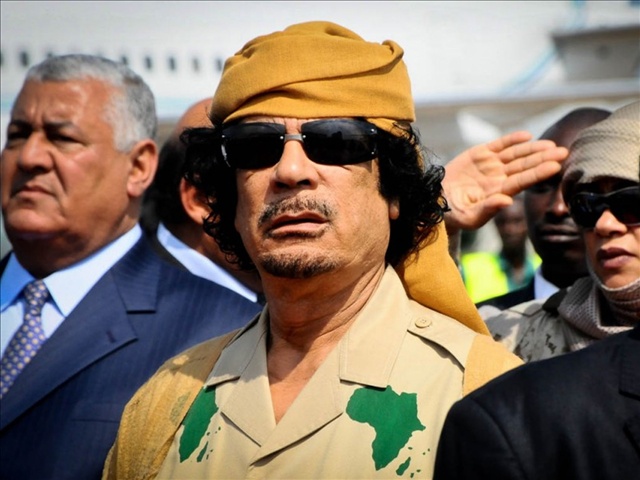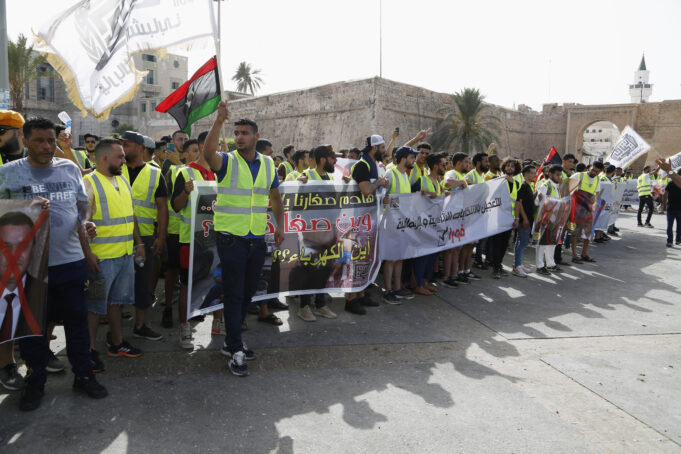Chaos is the order of the day in Libya more than a decade after the American-NATO overthrow and murder of longtime leader Muammar Gadhafi who ruled the North African nation and led a revolutionary movement for 42 years.
Acute tribal discord, a grueling civil war, and failure to create a comprehensive government have plagued Libya.
The country is still torn between two rival governments vying for legitimacy in a nation paralyzed politically after Western involvement in 2011. Nothing has been stable since.
“We could write a book on the tragedy of Libya,” said Abdul Akbar Muhammad, International Representative of the Honorable Minister Louis Farrakhan and the Nation of Islam. “What has happened in Libya is a tragedy laying at the feet of the West, and how they destroyed Libya.”
Opposition forces, backed by America and NATO, made a mess out of a once beautiful country that used its resources to develop its people and aided other freedom and justice seeking people worldwide, said Min. Akbar Muhammad.
“So what you see in the streets of Libya now is the fallout,” he said.
Mr. Muhammad was referring to mass demonstrations around the country protesting deteriorated living conditions, food and fuel cost increases, and ever-growing poverty.

Angry protests gripped the country July 1 where Libyans expressed resentment over dire economic and political prospects. Demonstrations have erupted in the Libyan capital of Tripoli, in the West, and other major cities.
In a day of rage, government structures, including the parliament building in the eastern port city of Tobruk were trashed and set ablaze.
Libya’s House of Representatives is based in Tobruk nearly 800 miles east of Tripoli since an East-West rift intensified in 2014.
“We want the lights to work,” crowds chanted, according to local media. Images of people holding posters of Libyan political leaders with their faces “x’d” out, while other images showed protestors brandishing the green flag of the deposed Great Jamahiriya government of Col. Gadhafi.
“The protests are a result of a number of things … the power outages are just a straw that broke the camel’s back,” said Netfa Freeman, organizer with Pan African Community Action. “Things have been mounting for the Libyan people for a long time,” he added.
Libyans took to the streets when United Nations talks broke down between leaders in Geneva, Switzerland, trying to formulate an agreement for elections to move the country forward.
With unrest spreading, UN Secretary General Antonio Guterres called for ending the stalemate.
“The Secretary-General urges Libyan actors to come together to overcome the continued political deadlock, which is deepening divisions and negatively impacting the country’s economy,” said spokesperson Stephane Dujarric, in a July 2 statement.
Libya under Mr. Gadhafi had one of the highest standards of living in Africa, with free health care and free education. The streets are now screaming over worsening conditions. Despite Libya being an oil rich nation, fuel shortages and 18-hour-a-day power cuts are the norm.
Demands for elections, postponed since last December, are on the lips of frustrated protestors.
“This has gone on through at least three different governments of national unity. They all have been set up by the United Nations, endorsed by them. Even the most recent plan has fallen apart, and the people there are just frustrated, fed up with the inability of the factions in Libya to unite and to try to deal with the economic crisis,” Abayomi Azikiwe, political analyst and editor of Pan African Newswire told The Final Call.
“Even though Libya is an oil producing country, the cost of living is skyrocketing as it is everywhere else throughout the entire capitalist world,” he explained.
The unraveling of Libya has been at play since the U.S.-NATO invasion and backing of insurgents to overthrow Col. Gadhafi and assassinate him. Voices of concern, most importantly Minister Farrakhan of the Nation of Islam, warned against Western warmongering in the country.
“I feel like I have lost a very, very important member of my own family, I can’t take the assassination of Muammar Gadhafi lightly, as I could not take the assassination of my brother, or my mother, or my wife or my children lightly. That’s the kind of relationship that we had and that we have,” Min. Farrakhan, said in an Oct. 25, 2011, interview on WVON-AM radio Chicago days after the killing.
“I’ve come to say to the world that the Nation of Islam mourns the loss of a great brother, leader, the Lion of the Desert, the Lion of Africa, and those who rejoice at his death, your laughter will turn to tears and your joy will turn to sorrow and great pain because of what the Western world and those collaborators will lose as a result of his betrayal and his ultimate assassination,” predicted Minister Farrakhan.
“But your ‘joy,’ I hate to say: Your joy will be short lived, for what you have done, America, England, France, Italy, Canada, and all who were involved; plus some of the Arab League, Qatar and others: You have set in motion something that will ultimately bring about the destruction, first of the United Nations,” said Minister Farrakhan.
“And we, today, need to watch for those ‘close around’ for signs of betrayal, because it is written in the scriptures of the Bible that in the Last Days, perilous times will come. And betrayal will be one of the marks of the end of the world because people will feel that they’ll be safer betraying a good cause, a just cause, to save their lives,” said Minister Farrakhan.
Abdul Akbar Muhammad described the crisis in Libya as the “bitter fruit of betrayal.”
None of the contending factions have been able to unify the country so now it is up to the Libyan people, Mr. Azikiwe stated.
“I think the foreign powers there have done enough damage in sowing disunity,” he added.
Libya’s woes have impacted North Africa and West Africa, the analyst continued. War in Mali, in West Africa, is rooted in the instability in Libya as well as the spread of “so-called” jihadist groups in Burkina Faso, Chad, and other countries, noted observers.
“It’s an instability that was engineered by the West and they have to accept responsibility for what they’ve done,” said Mr. Azikiwe. “They have to help correct the problem by supporting the Libyan people as opposed to supporting various factions vying for leadership.”
The problem is a lack of experience in Libya with civil society organizations, political parties, and other entities, argued Bill Fletcher, Jr., past president of TransAfrica Forum.
“You had, instead, tribal affiliations and regional affiliations. So, when the central government breaks down, the Transitional Council was put together, but was simply too weak,” he said.
Instability is further fueled by the involvement of external actors like Egypt, Turkey, the United Arab Emirates, and Russia who are in Libya, he said. They became major players and influencers.
“This most recent uprising,” he said, “it’s probably one of the best things that could happen in Libya because it’s the political situation that needs to be shaken with the external actors,” said Mr. Fletcher.













